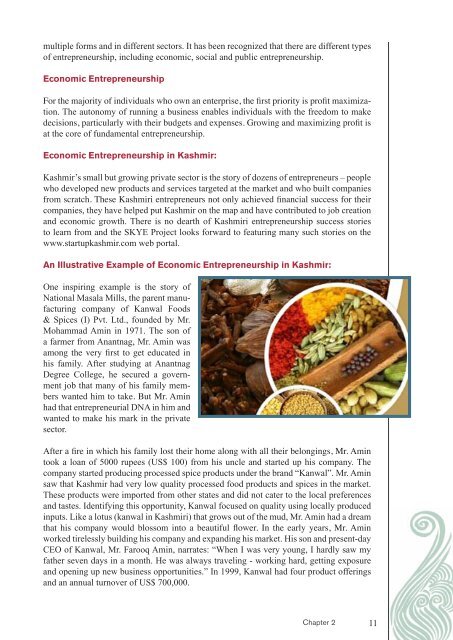Here - Start-up Kashmir!
Here - Start-up Kashmir!
Here - Start-up Kashmir!
You also want an ePaper? Increase the reach of your titles
YUMPU automatically turns print PDFs into web optimized ePapers that Google loves.
multiple forms and in different sectors. It has been recognized that there are different types<br />
of entrepreneurship, including economic, social and public entrepreneurship.<br />
Economic Entrepreneurship<br />
For the majority of individuals who own an enterprise, the first priority is profit maximization.<br />
The autonomy of running a business enables individuals with the freedom to make<br />
decisions, particularly with their budgets and expenses. Growing and maximizing profit is<br />
at the core of fundamental entrepreneurship.<br />
Economic Entrepreneurship in <strong>Kashmir</strong>:<br />
<strong>Kashmir</strong>’s small but growing private sector is the story of dozens of entrepreneurs – people<br />
who developed new products and services targeted at the market and who built companies<br />
from scratch. These <strong>Kashmir</strong>i entrepreneurs not only achieved financial success for their<br />
companies, they have helped put <strong>Kashmir</strong> on the map and have contributed to job creation<br />
and economic growth. There is no dearth of <strong>Kashmir</strong>i entrepreneurship success stories<br />
to learn from and the SKYE Project looks forward to featuring many such stories on the<br />
www.start<strong>up</strong>kashmir.com web portal.<br />
An Illustrative Example of Economic Entrepreneurship in <strong>Kashmir</strong>:<br />
One inspiring example is the story of<br />
National Masala Mills, the parent manufacturing<br />
company of Kanwal Foods<br />
& Spices (I) Pvt. Ltd., founded by Mr.<br />
Mohammad Amin in 1971. The son of<br />
a farmer from Anantnag, Mr. Amin was<br />
among the very first to get educated in<br />
his family. After studying at Anantnag<br />
Degree College, he secured a government<br />
job that many of his family members<br />
wanted him to take. But Mr. Amin<br />
had that entrepreneurial DNA in him and<br />
wanted to make his mark in the private<br />
sector.<br />
After a fire in which his family lost their home along with all their belongings, Mr. Amin<br />
took a loan of 5000 r<strong>up</strong>ees (US$ 100) from his uncle and started <strong>up</strong> his company. The<br />
company started producing processed spice products under the brand “Kanwal”. Mr. Amin<br />
saw that <strong>Kashmir</strong> had very low quality processed food products and spices in the market.<br />
These products were imported from other states and did not cater to the local preferences<br />
and tastes. Identifying this opportunity, Kanwal focused on quality using locally produced<br />
inputs. Like a lotus (kanwal in <strong>Kashmir</strong>i) that grows out of the mud, Mr. Amin had a dream<br />
that his company would blossom into a beautiful flower. In the early years, Mr. Amin<br />
worked tirelessly building his company and expanding his market. His son and present-day<br />
CEO of Kanwal, Mr. Farooq Amin, narrates: “When I was very young, I hardly saw my<br />
father seven days in a month. He was always traveling - working hard, getting exposure<br />
and opening <strong>up</strong> new business opportunities.” In 1999, Kanwal had four product offerings<br />
and an annual turnover of US$ 700,000.<br />
Chapter 2 11


